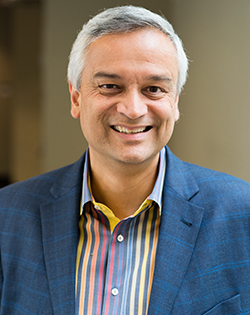
| Vol.
XXVII No.
5 May / June 2015 |
| contents |
| Printable Version |
Krishna Rajagopal New Faculty Chair

Krishna Rajagopal, Professor of Physics, will become Chair of the Faculty on July 1, 2015 after serving as Chair-Elect for the past year. He has been learning the ropes from the current Chair, Steve Hall, whose example he sees as setting a high bar. Joining Krishna as faculty officers this summer will be Leslie Kolodziejski, Professor of Electrical Engineering and Computer Science (Associate Chair) and Chris Capozzola, Professor of History (Secretary).
Krishna grew up in suburban Toronto; his family moved there from Munich when he was less than a year old. His mother and father, who taught at different Toronto universities, are originally from Germany and India. Influenced by an outstanding teacher who brought pioneering advances in recombinant DNA and molecular biology into his public high school biology class, Krishna arrived at Queen’s University in Kingston, Ontario planning to major in biology. His freshman physics class rekindled his earlier interest in physics. He much appreciates the formative educational influences that shaped his own experience. He graduated from Queen’s in 1988 and completed his PhD at Princeton in 1993. After stints as a Junior Fellow at Harvard and a Fairchild Fellow at Caltech he joined the MIT faculty in 1997. He was elected a Fellow of the American Physical Society in 2004. Krishna has spent one year each at UC Berkeley and at CERN, the physics laboratory outside Geneva, Switzerland.
Krishna is a theoretical physicist who asks how the quarks that in ordinary matter are found confined within protons and neutrons behave in extraordinary conditions, conditions that provide a testbed for understanding how a complex world can emerge from simple underlying laws. His work links nuclear and particle physics, condensed matter physics, astrophysics, and string theory.
Experiments that recreate droplets of the trillions-of-degrees-hot matter that filled the microseconds-old universe show that it is an almost ideal liquid, nothing like the gas of quarks that was originally anticipated. Krishna analyzes the properties of this hot quark soup, by seeing how they emerge from the elementary forces between quarks and via repurposing techniques from string theory to understand how hot quark soup is created and probed in high energy collisions, the subject of his recently completed first book. He is the author of about 100 papers and has mentored more than two-dozen PhD students and postdocs. Krishna’s work has also illuminated the cold, dense, quark matter that may lie at the centers of neutron stars, showing that matter at the highest densities imaginable is a transparent superconductor. Krishna has made predictions for the phase diagram of quark matter, hot and cold, and has helped to define the experimental program that is currently mapping it.
Krishna was named a Margaret MacVicar Faculty Fellow in 2010 and won the Baker Award for Excellence in Undergraduate Education in 2011. All of his classroom teaching has been at the freshman, sophomore, or junior level. He has taught quantum mechanics, relativity, thermodynamics, and statistical mechanics and is currently teaching freshman electricity and magnetism. What he most enjoys is opening students' eyes, for the first time, to powerful and far-reaching ways of understanding the natural and technological world around them.
Until this past January, Krishna was the Associate Head for Education in the Department of Physics, responsible for the stewardship of all of its educational efforts, from the freshman level through to the PhD, helping his departmental colleagues and students to optimize the use of their talents and to realize their educational goals. He has facilitated and supported new MITx-enabled activities within the Department of Physics. These included efforts that have improved the on-campus teaching of freshman physics and junior lab, as well as the first Open Online Courses on intermediate quantum mechanics at a level suitable for MIT juniors and advanced quantum field theory at a level suitable for second- and third-year theoretical physics PhD students.
What Krishna has most valued about his Institute service, for example as the chair of the Committee on Academic Performance and as a member of a number of ad hoc committees, has been the people he has met; the staff, students and faculty whose character knits our community together and makes MIT MIT. He looks forward to getting to know, and help, many more in the coming two years.
Krishna lives in Arlington with his wife, Dana Ansel, who was for many years the Research Director at the Massachusetts Institute for a New Commonwealth (MassINC) and is now an education policy research consultant, and with their two sons, who will be in 5th and 7th grade this fall.
| Back to top | |
| Send your comments |
| home this issue archives editorial board contact us faculty website |